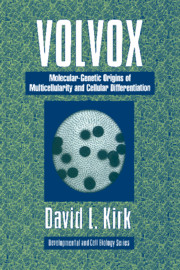 Volvox
Volvox Published online by Cambridge University Press: 16 December 2009
I believe that … the offspring owes its origin to a peculiar substance of extremely complicated structure, viz., the “germ–plasm”. This substance can never be formed anew; it can only grow, multiply and be transmitted from one generation to another.
… we may now hope to succeed in recognizing the probable explanations among the many possible ones. … This will assuredly be the work of time, and our approach to the truth will be a very gradual one. … What … appears to afford additional promise of success is that we can … approach from two sides; – namely, by observations, firstly on the phenomena of heredity, and secondly, on the hereditary substance itself, with which we are now of course acquainted.
Weismann (1892b)… understanding cell differentiation in Volvox will require knowledge of its nucleic acid metabolism. …
Kochert and Sansing (1971)When he was writing his magnum opus, it is unlikely that August Weismann had any notion just how gradual the “approach to the truth” regarding the role of the hereditary substance in embryonic development would be in the next eight decades – or how different the outcome would be from the one that he was predicting! On the other hand, it is equally unlikely that when Kochert published the first studies of Volvox nucleic acids (only three years after he had described development in the forma of Volvox carteri that carries Weismann's name) he could have anticipated how dramatically the pace – and indeed the very nature – of studies of “nucleic acid metabolism” was destined to change in the next two decades.
To save this book to your Kindle, first ensure [email protected] is added to your Approved Personal Document E-mail List under your Personal Document Settings on the Manage Your Content and Devices page of your Amazon account. Then enter the ‘name’ part of your Kindle email address below. Find out more about saving to your Kindle.
Note you can select to save to either the @free.kindle.com or @kindle.com variations. ‘@free.kindle.com’ emails are free but can only be saved to your device when it is connected to wi-fi. ‘@kindle.com’ emails can be delivered even when you are not connected to wi-fi, but note that service fees apply.
Find out more about the Kindle Personal Document Service.
To save content items to your account, please confirm that you agree to abide by our usage policies. If this is the first time you use this feature, you will be asked to authorise Cambridge Core to connect with your account. Find out more about saving content to Dropbox.
To save content items to your account, please confirm that you agree to abide by our usage policies. If this is the first time you use this feature, you will be asked to authorise Cambridge Core to connect with your account. Find out more about saving content to Google Drive.